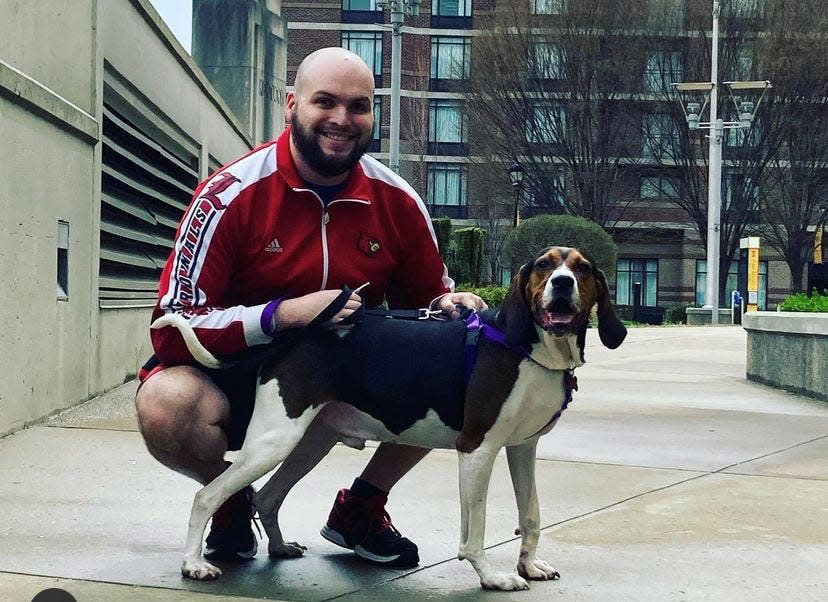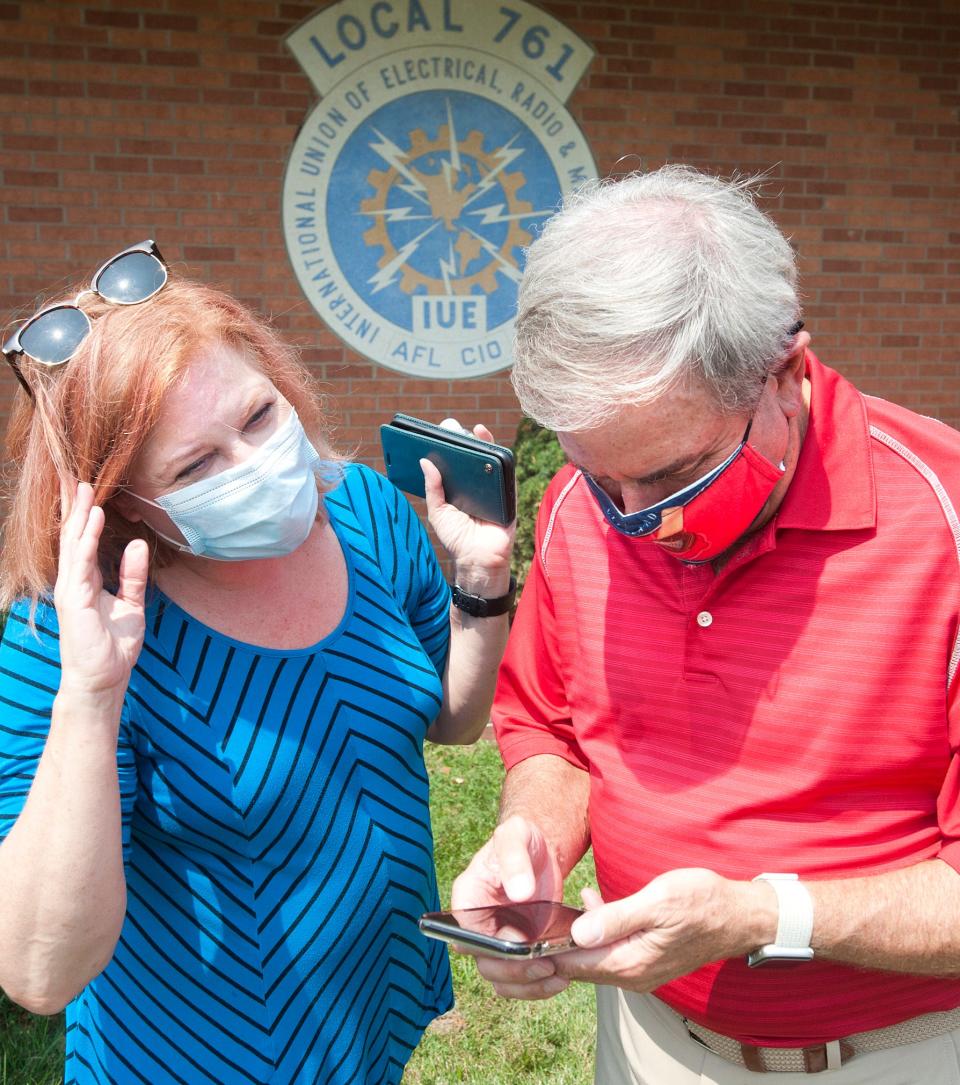'Breakthrough' cases of COVID-19 still affecting some who are vaccinated. Here's why
Fully vaccinated, Matt McGavic didn't suspect COVID-19 this summer until — feeling a little rundown — he picked up coffee on the way to work and this happened:
"I take a sip, and I can't taste a thing," the Louisville sportswriter recalled.
A test confirmed what he suspected from his temporary loss of taste and smell: McGavic, 29, had developed a "breakthrough" case of COVID-19.
About 17% of COVID-19 cases in Kentucky since March have been in people fully vaccinated, meaning they have had two shots of the Pfizer-BioNTech or Moderna vaccines or a single shot of Johnson & Johnson.
Health officials say to expect even more as the highly contagious omicron variant of COVID-19 begins to spread in Kentucky—though vaccines and boosters should protect people against severe cases.
"We just know that omicron is much more contagious than delta was," Dr. Sarah Moyer, director of the Louisville health department, said at a news conference Tuesday.
Louisville health officials said Tuesday the first local case of omicron had been confirmed in a 29-year-old woman who had received two doses of vaccine.
More than 1,865 fully vaccinated Kentuckians wound up in the hospital from March through early December. Statewide, nearly 2.4 million people are now fully vaccinated.

And 17% of COVID-19 deaths since March — 809 people — were in vaccinated individuals, according to records the administration of Kentucky Gov. Andy Beshear has been keeping since March, when vaccines became more widely available.
But public health officials emphatically declare that does not mean vaccines don't work — rather it shows that vaccines are doing their job of preventing serious illness, hospitalization or death among nearly all of those vaccinated.
They do not guarantee 100% immunity, however.
"For the majority of the population, the vaccine is going to be very effective and keep you out of the hospital and keep you alive," Dr. SarahBeth Hartlage, associate director of the Louisville Metro health department, said at a recent news conference.
More: COVID's toll on Kentucky school workers raises concerns over grieving students
Dr. Jason Smith, chief medical officer for University of Louisville Health, agrees.
"The vast majority of the people in the hospital are still unvaccinated," he said. "Ninety-five percent of the people that have severe disease and all the long-term consequences are not vaccinated."
Though the delta variant of COVID-19 had been behind most of the current cases, officials warn that the new, more contagious omicron variant spreading worldwide, could pose a threat of uncontrolled spread with about one-third of the state unvaccinated.
Others with recent breakthrough cases say vaccination works, including state Rep. Joni Jenkins, a Louisville Democrat who said she had almost no symptoms but tested positive for COVID-19 in October although she had been vaccinated and had received a booster shot.
"I believe the vaccine saved me from being really, really sick and possibly saved my life," said Jenkins, who at age 63 and with asthma considers herself at higher risk.
Recently, Rep. Brett Guthrie, R-Ky., announced on social media he had developed a mild case of COVID-19, adding in his Dec. 8 tweet, "I am glad I decided to get fully vaccinated."
And in September, University of Kentucky basketball coach John Calipari disclosed he'd kept quiet for a few months about a mild breakthrough case of COVID-19 he developed out of fear it might discourage others from getting vaccinated.
"I don’t want to hear anybody died because they didn’t do it," Calipari said.
Older, sicker people at risk
In Jefferson County, 66 deaths have occurred since March among vaccinated individuals — about 24% of all local COVID-19 deaths during that time, according to the health department.
But nearly all have been in people over 65 with other health conditions that put them at greater risk of complications if they contract COVID-19, such as cancer, high blood pressure, cardiovascular disease, diabetes or obesity, Moyer said..
Jefferson County may have a higher percentage of deaths among those vaccinated for COVID-19 because it has a higher concentration of nursing homes and other settings for older people with multiple health problems, health officials said.
In Jefferson County, about 70% of people 18 or older are vaccinated with at least one dose.
More: COVID-19 & flu are on the rise. Louisville in for 'a very hard winter,' health leader says
"That small percentage in our community that is not fully vaccinated is a majority of our cases and deaths," Moyer said.
About 65% of all Kentuckians eligible have had at least one dose of vaccine, Gov. Andy Beshear reported recently.
While that's "incredible," Beshear added "it's not enough" and urged more Kentuckians to get vaccinated,
The free vaccine is now available to anyone 5 or older. Boosters, to help with waning immunity, are available to those 16 or older who have already had their first round of vaccine.
A recent report from the Kaiser Family Foundation said cases of vaccinated people hospitalized after a breakthrough case of COVID-19 most often are older adults and people with chronic health conditions. Also, it said fully vaccinated people who are hospitalized are less likely to have complications or require a ventilator and tend to have shorter hospital stays.
'Worst I've ever felt'
McGavic recently got a booster shot of the Pfizer vaccine. He said he fully endorses the vaccine and, though he was sick at home a few days with COVID-19, believes it prevented him from an even worse case.
He said he experienced most of the symptoms of COVID-19 including headache, fever, nausea and body aches so severe "it hurt to move."
"It's the worst I've ever felt without having to go to the hospital," he said. "I'm convinced with how bad I felt those two days, that if I had not been vaccinated I would have ended up in the hospital."
Health officials warn that unless more people get fully vaccinated, COVID-19 will continue to spread and possibly mutate into new forms, such as the omicron variant recently identified in South Africa and now showing up in countries worldwide, including the United States.
"The best thing anybody could do for our community, if they haven't already been vaccinated, is to get vaccinated, and if they have been vaccinated and are due for the booster, is to get the booster," said Dr. Emily Volk, chief medical officer for Baptist Health Floyd. "Even if they've had COVID-19, they should get the vaccine. The vaccine provides much broader protection than just having had the illness."

Currently, cases are climbing in Kentucky after a brief slowdown from a surge in cases over the summer and fall that began after delta took hold.
Smith believes the state is in for another surge of cases as people gather inside and celebrate the holidays.
"My guess is that it's going to be a long winter again," he said.
'Almost like allergies'
Some vaccinated people have few or no symptoms from a breakthrough infection.
That includes Jenkins, minority leader of the House Democrats.
Jenkins said she tested positive for COVID-19 in October even though she had no symptoms other than a few "sniffles."
"It felt almost like allergies," she said.
Jenkins discovered she had COVID-19 because she was participating in a voluntary home testing program through kits the health department distributed to encourage testing in areas with lower vaccination rates, which includes Jenkins' Shively community.
When the home test was positive Oct. 30, Jenkins got another test at a lab, and on Halloween, it confirmed she had COVID-19.
As a precaution, she said she got an infusion of monoclonal antibodies, which helps boost immunity.

Jenkins said she never felt ill and stayed busy working from home during a 10-day quarantine she jokes was "COVID jail." Her main concern was making sure she hadn't transmitted it to her father, 90, and mother, 87.
She hadn't. Her parents also are vaccinated, which Jenkins said she thinks protected them from any possible contagion from her.
"At their ages, I think it saved their lives," she said.
McGavic, who also got an antibody infusion, was surprised at how sick he became from COVID-19 but relieved it lasted only a few days.
Smith, the U of L doctor, said the unpredictably of COVID-19 and how it hits people differently is all the more reason to get vaccinated.
"It's just so varied," he said. "People without the vaccine who get the disease, some may be fine. Some may have severe infection. It's very difficult to predict who's going to fall into those categories."
Reach Deborah Yetter at dyetter@courier-journal.com or 502-582-4228. Find her on Twitter at @d_yetter. Support strong local journalism by subscribing today: www.courier-journal.com/subscribe.
This article originally appeared on Louisville Courier Journal: Breakthrough cases of COVID-19 still affect some who are vaccinated

